- Home
- Raymond E. Feist
Krondor: The Assassins Page 5
Krondor: The Assassins Read online
Page 5
De Lacy handed them to James who tucked them under his arm without looking at them.
The Master of Ceremonies looked at the sheriff, who stepped forward and bowed. ‘‘Highness, I fear I must report a rash of black murders have been done in your city during the time you’ve been away.’’
The Prince was silent for a moment as he considered these words, then he said, ‘‘You speak then of something warranting my personal attention? Murder is not uncommon in our city.’’
‘‘I do, Highness. Several men of prominence have been slain 45
R A Y M O N D E . F E I S T
in their beds at night, throats cut while their wives slept undisturbed beside them.’’
Arutha glanced at James and nodded slightly. James knew what the Prince was thinking: Nighthawks.
For nearly ten years the city had been untroubled by the Guild of Death. The assassins who had been employed by Murmandamus’s agents had vanished at the end of the Riftwar. A few months ago rumors about their return had begun to circu-late. Then they had suddenly reappeared in the Kingdom. James himself had killed their current leader, but was under no illusion that the Nighthawks would just go away. If there was another cell of them here in Krondor, they already knew of the death of one called Navon du Sandau, an erstwhile merchant from Kenting Rush. Exposing his true identity had almost gotten James killed in a duel, and it was only by dint of hours spent practicing the sword with Arutha that James had prevailed.
Looking troubled, Arutha asked the sheriff, ‘‘What have your men uncovered?’’
‘‘Nothing, Highness. Of some of the victims, what you’d expect: men with enemies due to their prominence in their trade. But others were men of little significance except to their families. There is nothing of sense about these murders. They seem . . . random.’’
Arutha sat back and weighed what he had been told. His mind turned furiously as he considered, then discarded options.
Finally he said, ‘‘Random? It may be we simply do not understand what is behind the selection of victims. Have your men return in the morning and question the families of the victims, those who worked with them, their neighbors and anyone who may have seen them prior to their deaths. There may be some vital bit of information we are not seeing because we do not 46
K R O N D O R : T H E A S S A S S I N S
know it is important. Send a scribe with your men to record the conversations. In all of this we may discover some connection between those murdered.’’ He sighed, fatigue evident in his features. ‘‘Return to your post, sheriff. Join me after morning court tomorrow and we’ll discuss this business at length. I’ll want your men’s reports by tomorrow evening.’’ The sheriff bowed and withdrew.
Arutha turned to de Lacy. ‘‘What else?’’
‘‘Nothing that cannot wait, Highness.’’
Arutha rose. ‘‘Court is dismissed until the tenth hour of the day tomorrow.’’ De Lacy and Jerome left the chamber, and Arutha turned to Gardan and the squires. ‘‘Now, Gardan, what is it you wished to speak with me about?’’
‘‘Highness, I’ve served your house since I was a boy. I’ve been a soldier and sergeant to your father, and a captain and marshal to you. It’s time I returned home to Crydee. I wish to retire.’’
Arutha nodded. ‘‘I see. Can we speak of this over supper?’’
The Knight-Marshal said, ‘‘If you wish.’’
‘‘I do.’’ Turning to the squires, Arutha said, ‘‘Locklear, you’d best be getting ready for your journey tomorrow morning. I’ll have travel warrants and orders sent to your quarters. Leave with the dawn patrol to Sarth. If I fail to see you before then, have a safe journey to Tyr-Sog.’’
Locklear tried to keep his expression neutral as he answered,
‘‘Thank you, Your Highness.’’
Arutha turned to James and said again, ‘‘You know what to do.’’
Arutha and Gardan turned toward the royal apartments as the two squires moved in the other direction. When they were 47
R A Y M O N D E . F E I S T
out of hearing distance, Locklear mimicked the Prince: ‘‘ ‘You know what to do.’ All right: what is this all about?’
James sighed and said, ‘‘It means I don’t get any sleep tonight.’’
Locklear said, ‘‘Is this your way of telling me it’s none of my business?’’
‘‘Yes,’’ James answered. He said nothing more as they moved to the wing of the palace which housed their quarters. Reaching the door to Locklear’s room, James said, ‘‘I probably won’t see you before you leave, also, so take care not to get yourself killed.’’
Locklear shook hands, then embraced his best friend. ‘‘I’ll try not to.’’
James grinned. ‘‘Good, then with luck we’ll see you at Mid-summer’s Festival, assuming you don’t do anything to cause Arutha to keep you up there longer than that.’’
Locklear said, ‘‘I’ll be good.’’
‘‘See that you are,’’ instructed James.
He left his friend and hurried to his own quarters. Being a member of the Prince’s court merited James a room of his own, but since he was only a squire, it was a modest one; a bed, a table for writing or eating a solitary meal, and a double door wooden wardrobe. James closed the door to his room, locking it behind him, and undressed. He was wearing travel clothing, but it was still too conspicuous for what he needed to do.
Opening his wardrobe, he moved aside a bundle of shirts in need of laundry, and beneath those he found what he was looking for. A dark gray tunic and dark blue trousers, patched and mended and looking far dirtier than they actually were.
He dressed in those, pulled on his oldest boots and slipped a well-made but plain-looking dagger into his boot-sheath. Then 48
K R O N D O R : T H E A S S A S S I N S
once again looking like a creature of the streets, he slipped out through the door of his quarters, avoiding servants and guards as he made his way down into the palace cellar.
Soon he was moving through a secret passage that connected the palace with the city sewers, and as night fell on Krondor Jimmy the Hand once more moved along the Thieves’ Highway.
The sun had set by the time James reached the transition point between the sewer under the palace and the city sewer system.
The sky above might still be light for a while, but beneath the streets it was as dark as night. During the day there were places in the sewer where illumination filtered down from above, tunnels close to the surface where culverts had broken through, others below streets where missing stones or open drains admitted daylight.
But after sundown, the entire system was pitch-black, save for a few locations with light sources of their own, and only an expert could move through the maze of passages safely.
From the moment he left the palace, James knew exactly where he was.
While a member of the Guild of Thieves, the Mockers, James had learned every trick of survival that harsh circumstance, opportunity, and keen native intelligence had presented to him. He moved silently to a stash he had prepared and moved a false stone. It was fashioned from cloth, wood, and paint, and in light far brighter than any likely to ever be present here, it would withstand inspection. He set the false stone down and retrieved a shuttered lantern from the stash. The hidey-hole held an extra set of picks, as well as a number of items unlikely to be welcome inside the palace proper: some caustic 49
R A Y M O N D E . F E I S T
agents, climbing equipment, and a few non-standard weapons.
Old habits died hard.
James lit the lantern. He had never considered keeping a lantern in the palace, for fear someone might observe him making the transition between the palace sewer and the one under the city. Guarding the secret of how the palace could be reached through the sewers was paramount. Every drawing on file in the palace, from the original keep through the latest expansion, showed the two systems as entirely separate, just as the city’s sewer was
divided from the one outside the city walls.
But smugglers and thieves had quickly rendered royal plans inaccurate, by creating passages in and out of the city.
James trimmed the wick, lit it, and closed the shutters until only a tiny sliver of light shone, but it was enough for him to navigate his way safely through the sewer. He could do it with no light, he knew, but it would slow him down to a painful near-crawl to have to feel his way along the walls the entire way, and he had a good distance to travel this night.
James did a quick check to insure he had left nothing exposed for anyone to chance across. He considered the never-ending need for security which created this odd paradox: the Royal Engineers spent a lot of time and gold repairing the city’s sewers—and just as quickly the Mockers and others damaged them to have a furtive passage free of royal oversight. James often was the one responsible for identifying a new breach.
Occasionally he was guilty of hiding one, if it suited his purposes more than it compromised the palace’s security.
Thinking that there was a great deal more to being a responsible member of the Prince’s court than he had imagined when he had first been put in the company of squires, the former thief hurried on toward his first appointment.
50
K R O N D O R : T H E A S S A S S I N S
*
*
*
It was almost dawn when James started looking for his last contact. The squire was having trouble keeping his concerns in check. The first three informants he had sought were missing. The docks were unnaturally silent, devoid of even the boisterous noise usually marking the area’s inns and taverns. The poor quarter was clearly a no man’s land, with many of the Mockers’
usual bolt-holes and accesses blocked off and sealed.
Of the Mockers, James had seen nothing. That alone was not completely unusual. He wasn’t the only one adroit at traveling through the sewers and streets unnoticed. But there was something different about this night. There were others who used the sewers. Beggars who weren’t Mockers had places where they could sleep unmolested. Smugglers moved cargo short distances from secret landings built into the larger outflows into the harbor to basements farther in the city. With such activities came noises: small, unnoticed unless one was trained to recognize them for what they were, but usually they were there.
Tonight everything was silent. Only the murmur of water, the scurrying of rats and the occasional rattle of distant machinery, waterwheels, pumps, and sluice gates echoed through the tunnels.
Anyone in the sewers was lying low, James knew. And that meant trouble. Historically, in times of trouble, the Mockers would seal off sections of the sewers, especially near the poor quarter, barring the passages to Mockers’ Rest, the place called
‘‘Mother’s’’ by members of the Guild of Thieves. Armed bashers would take up station and wait for the crisis to pass. Others not belonging to the guild would also hole up until the trouble passed. Outside those enclaves and safe areas, anyone in the tunnels was fair game. The last time James had remembered 51
R A Y M O N D E . F E I S T
such a condition had been during the year following the end of the Riftwar, when Princess Anita had been injured and Arutha had declared martial law.
The more he had traveled through the sewers below and the streets above, the more James was convinced something equally dire had occurred while he had been out of the city on the Prince’s business. James looked around to see that he was unwatched and moved to the rear of the alley.
A pair of old wooden crates had been turned toward a brick wall to offer some shelter against the elements. Inside that crate lay a still form. A swarm of flies took off as James moved the crate slightly. Before he touched the man’s leg, James knew he wasn’t sleeping. Gingerly he turned over the still form of Old Edwin, a one-time sailor whose love of drink had cost him his livelihood, family, and any shred of dignity. But, James thought, even a gutter-rat like Edwin deserved better than having his throat cut like a calf at slaughter.
The thick, nearly-dried blood told James he had been murdered earlier, probably around dawn the day before. He was certain that his other missing contacts had met a similar fate.
Either whoever was behind the troubles in the city was killing indiscriminately—and James’s informants had been exceedingly unfortunate—or someone was methodically murdering off James’s agents in Krondor. Logic dictated the latter as the most likely explanation.
James stood and looked skyward. The night was fading, as a gray light from the east heralded the dawn’s approach. There was only one place left he might find answers without risking confronting the Mockers.
James knew that some agreement between the Prince and Mockers had been reached years before when he had joined 52
K R O N D O R : T H E A S S A S S I N S
Arutha’s service, but he never knew the details. An understanding of sorts had arisen between James and the Mockers. He stayed out of their way and they avoided him. He came and went as he pleased in the sewers and across the roofs of the city when he needed, and they looked the other way. But at no time had he any illusion that he would be warmly welcomed should he attempt to return to Mockers’ Rest. You were either a Mocker or you weren’t, he knew, and for nearly fourteen years he had not been a Mocker.
James put aside concerns about braving a visit to Mother’s and turned toward the one other place he might find some news.
James returned to the sewer and made his way quickly to a spot below a particular inn. It sat on the border between the poorest quarter of the city and a slightly more respectable district, one inhabited by workmen and their families. A rank covering of slime hid a secret release, and once it was tripped, James felt a slight grinding as a section of stone swung aside.
The ‘‘stone’’ was made of plaster over heavy canvas, covering a narrow entryway to a short tunnel. Once inside the tunnel, with the secret door closed behind him, James opened the shutters of the lantern. He was almost certain he knew of every trap along the short passage, but as the key word was ‘‘almost’’
he took great caution as he traversed the tunnel.
At the far end he found a thick oaken door, on the other side of which he knew rose a short flight of stairs leading to a cellar below an inn. He inspected the lock and when he was satisfied nothing had changed, he picked it adroitly. When it clicked open, he pushed it gingerly aside against the possibility 53
R A Y M O N D E . F E I S T
of a new trap on the other side of the door. Nothing happened and he quickly mounted the stairs.
At the top of the stairs, he entered the dark cellar, thick with barrels and sacks. He moved through the maze of stores and climbed the wooden steps up to the main floor of the building, opening into a pantry, behind the kitchen. He opened the door.
A young woman’s scream split the air and a moment later a crossbow bolt flew through the space James had occupied the instant before. The young man rolled on the floor as the bolt splintered the wooden door and James came to his feet with his hands held palm out as he said, ‘‘Easy, Lucas! It’s me!’’
The innkeeper, a former soldier in his youth, was halfway around the kitchen, the crossbow set aside as he was drawing his sword. He had grabbed the crossbow and fired through the door, across the kitchen, upon hearing the scream. He hesitated a moment, then returned his sword to its scabbard as he continued moving toward James.
He circled around a butcher’s block. ‘‘You idiot!’’ he hissed, as if afraid to raise his voice. ‘‘You trying to get yourself killed?’’
‘‘Honestly, no,’’ said James as he stood up.
‘‘Dressed like that, sneaking at my cellar door, how’d I know it was you? You should have sent word you were coming that way, or waited an hour and come in the front door like an honest man.’’
‘‘Well, I am an honest man,’’ said James, moving from the kitchen, past the bar and into the empty common room. He glanced arou
nd, then sat down in a chair. ‘‘More or less.’’
Lucas gave him a half-smile. ‘‘More than some. What brings you crawling around like a cat in the gutter?’’
James glanced over at the young girl who had followed him 54
K R O N D O R : T H E A S S A S S I N S
and Lucas into the commons. She had regained her composure as the intruder was revealed to be a friend of the innkeeper.
‘‘Sorry to startle you.’’
She took a breath and said, ‘‘Well, you did a good job of it.’’ She stood upright, and her high color from the fright put her fair complexion in contrast to her dark hair. She appeared to be in her late teens or early twenties.
James asked, ‘‘The new barmaid?’’
‘‘My daughter, Talia.’’
James sat back. ‘‘Lucas, you don’t have a daughter.’’
The proprietor of The Rainbow Parrot sat down opposite James and said, ‘‘Run to the kitchen and see nothing’s burning, Talia.’’
‘‘Yes, father,’’ she said, leaving.
‘‘I have a daughter,’’ Lucas said to James. ‘‘When her mother died I sent her to live with my brother on his farm near Tannerbrook.’’
James smiled. ‘‘Didn’t want her to grow up in this place?’’
Lucas sighed. ‘‘No. It gets rough in here.’’
Feigning innocence, James said, ‘‘Why, Lucas. I never noticed.’’
Pointing an accusatory finger in his direction, Lucas said,
‘‘Far less savory characters than you have graced that chair, Jimmy the Hand.’’
James held up his hands as if surrendering. ‘‘I’ll concede as much.’’ He glanced toward the kitchen door as if somehow seeing through it. ‘‘But she doesn’t sound like any farm girl I’ve heard before, Lucas.’’
Lucas sat back, ran his bony hand through his gray-shot hair. His angular face showed irritation at having to explain.
‘‘She studied with a sisterhood in a nearby abbey for more hours 55

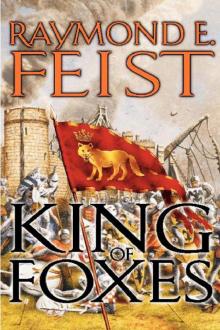 King of Foxes
King of Foxes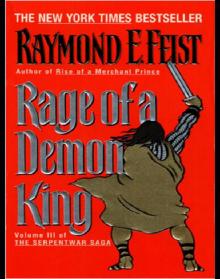 Rage of a Demon King
Rage of a Demon King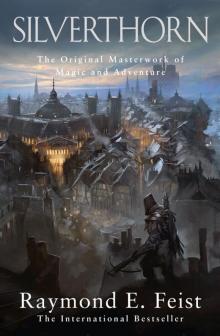 Silverthorn
Silverthorn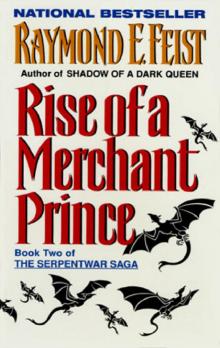 Rise of a Merchant Prince
Rise of a Merchant Prince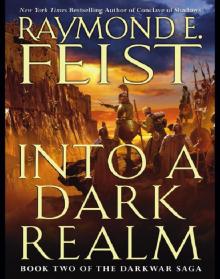 Into a Dark Realm: Book Two of the Darkwar Saga
Into a Dark Realm: Book Two of the Darkwar Saga Shadow of a Dark Queen
Shadow of a Dark Queen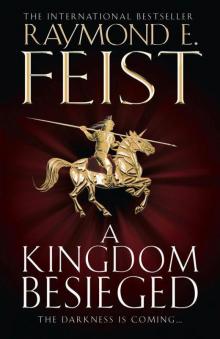 A Kingdom Besieged
A Kingdom Besieged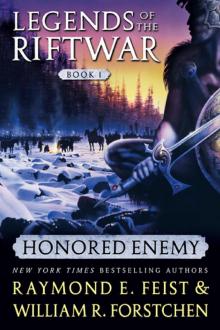 Honored Enemy
Honored Enemy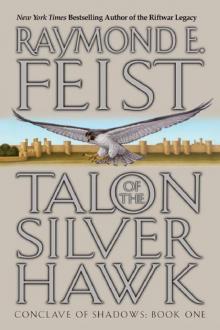 Talon of the Silver Hawk
Talon of the Silver Hawk The Complete Legends of the Riftwar Trilogy
The Complete Legends of the Riftwar Trilogy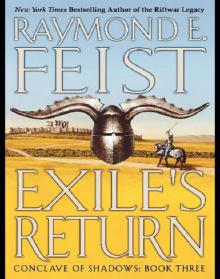 Exile's Return: Conclave of Shadows: Book Three
Exile's Return: Conclave of Shadows: Book Three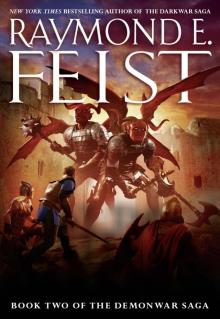 At the Gates of Darkness
At the Gates of Darkness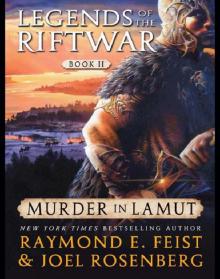 Murder in LaMut: Legends of the Riftwar: Book II
Murder in LaMut: Legends of the Riftwar: Book II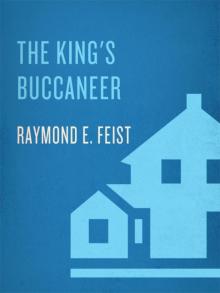 The King's Buccaneer
The King's Buccaneer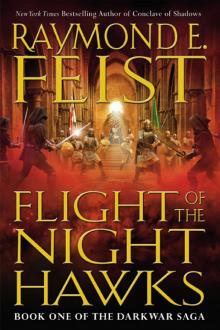 Flight of the Nighthawks
Flight of the Nighthawks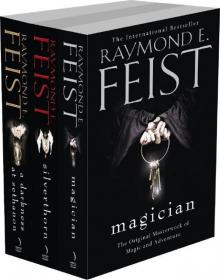 The Riftwar Saga
The Riftwar Saga A Darkness at Sethanon
A Darkness at Sethanon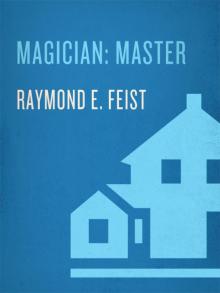 Magician: Master
Magician: Master A Crown Imperiled
A Crown Imperiled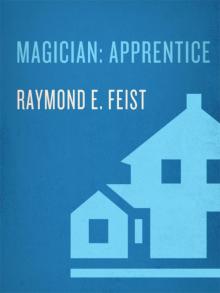 Magician: Apprentice
Magician: Apprentice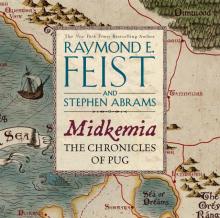 Midkemia
Midkemia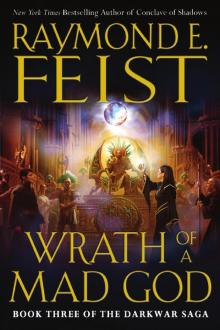 Wrath of a Mad God
Wrath of a Mad God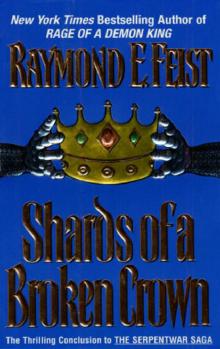 Shards of a Broken Crown
Shards of a Broken Crown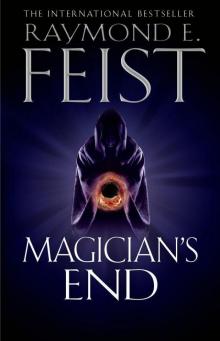 Magician's End
Magician's End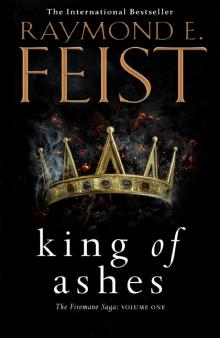 King of Ashes
King of Ashes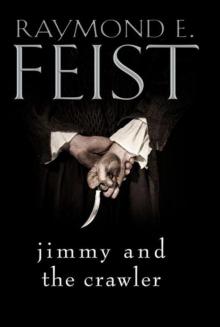 Jimmy and the Crawler
Jimmy and the Crawler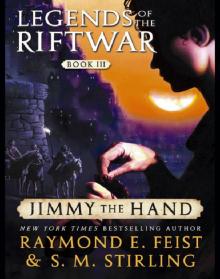 Jimmy the Hand: Legends of the Riftwar, Book 3
Jimmy the Hand: Legends of the Riftwar, Book 3 Queen of Storms
Queen of Storms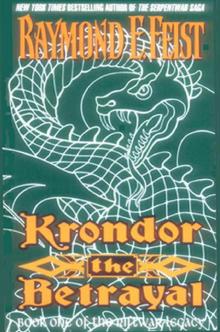 Krondor: The Betrayal
Krondor: The Betrayal Magician
Magician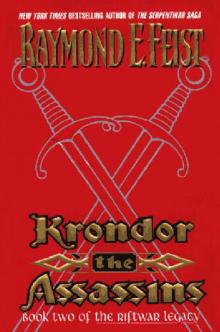 Krondor: The Assassins
Krondor: The Assassins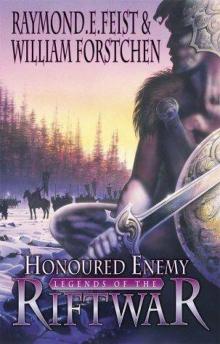 Honoured Enemy
Honoured Enemy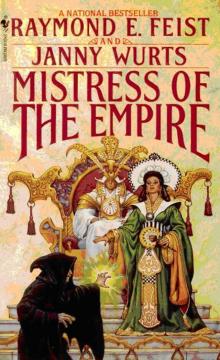 Mistress of the Empire
Mistress of the Empire The Complete Empire Trilogy
The Complete Empire Trilogy Legends 1 - Honoured Enemy
Legends 1 - Honoured Enemy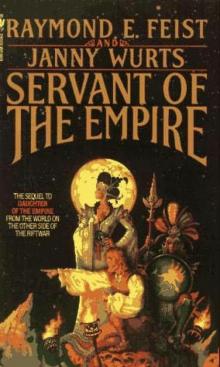 Empire - 02 - Servant Of The Empire
Empire - 02 - Servant Of The Empire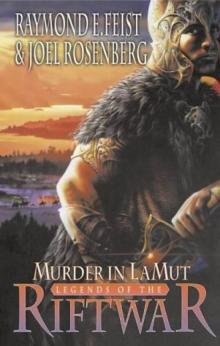 Murder In LaMut
Murder In LaMut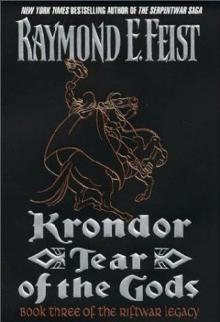 Krondor Tear of the Gods
Krondor Tear of the Gods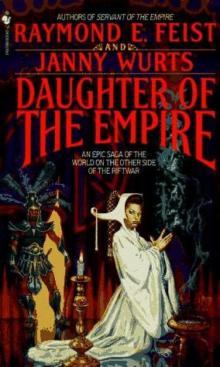 Empire - 01 - Daughter Of The Empire
Empire - 01 - Daughter Of The Empire![King of Ashes [Book One] Read online](http://i1.bookreadfree.com/i1/03/30/king_of_ashes_book_one_preview.jpg) King of Ashes [Book One]
King of Ashes [Book One]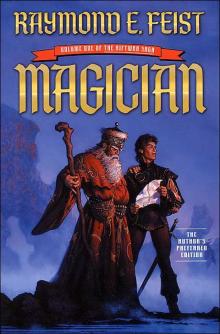 Magician (10th Aniversary Edition)
Magician (10th Aniversary Edition) Prince of the Blood, the King's Buccaneer
Prince of the Blood, the King's Buccaneer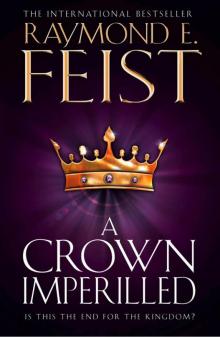 A Crown Imperilled cs-2
A Crown Imperilled cs-2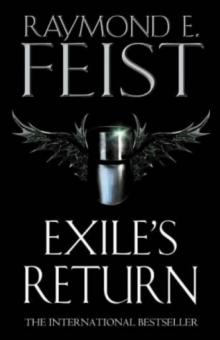 Exile's Return
Exile's Return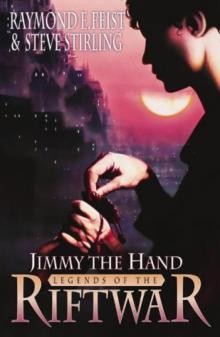 Jimmy the Hand
Jimmy the Hand Book 1 - Magician
Book 1 - Magician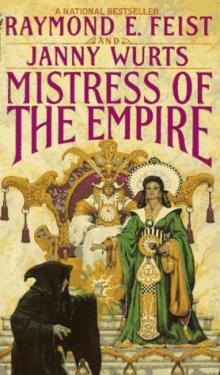 Empire - 03 - Mistress Of The Empire
Empire - 03 - Mistress Of The Empire Darkness at Sethanon
Darkness at Sethanon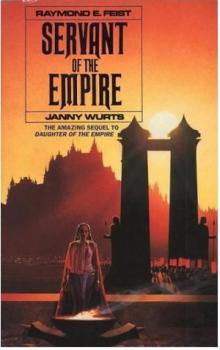 Servant of the Empire
Servant of the Empire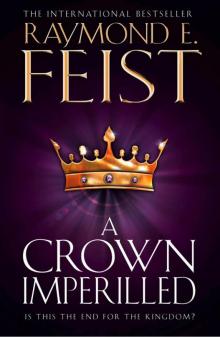 A Crown Imperilled
A Crown Imperilled Rides a Dread Legion
Rides a Dread Legion Legends of the Riftwar
Legends of the Riftwar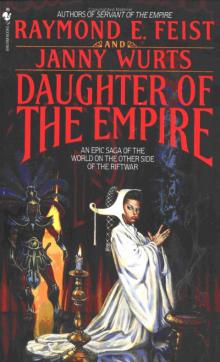 Daughter of the Empire
Daughter of the Empire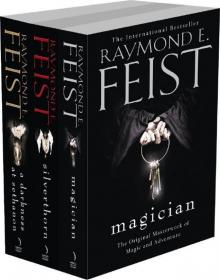 The Riftwar Saga Trilogy: Magician, Silverthorn and A Darkness at Sethanon
The Riftwar Saga Trilogy: Magician, Silverthorn and A Darkness at Sethanon